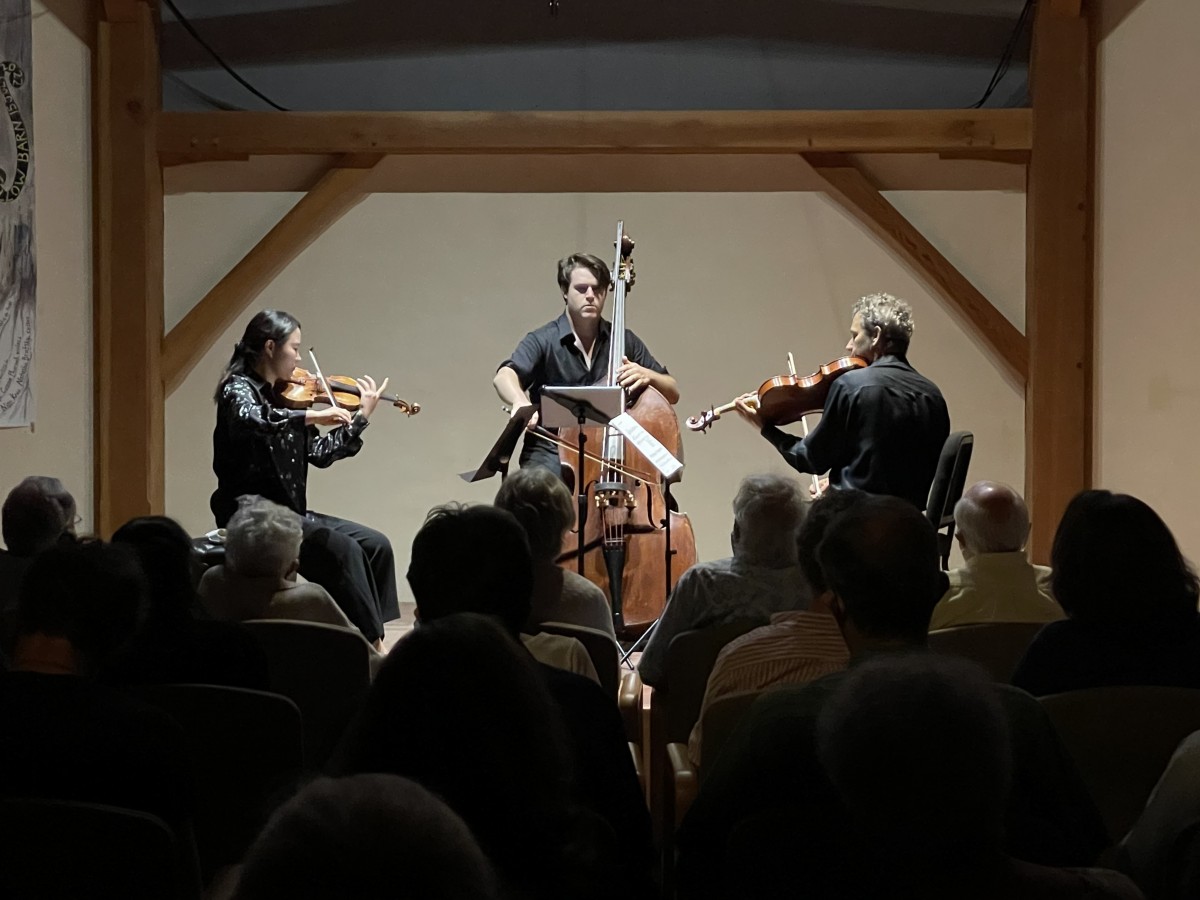On July 15, 2023, Jeremy Eichler visited Yellow Barn's summer festival, and subsequently wrote about his Barn experience for the Boston Globe:

SoYoung Choi, Sam Suggs, and Nicholas Mann perform selections from György Kurtág's "Signs, Games, and Messages" in the Big Barn
Kurtág, Brahms, and Symanowksi, with blueberries on top
On Friday night, the Yellow Barn music festival once more served up a bracing mix of old and newBy Jeremy Eichler, Globe Staff
PUTNEY, VT — A casual passerby could be forgiven for their raised eyebrows. On Friday evening, outside the general store in this small Vermont town with a population of just over 2,600, a group of students could be heard debating the merits of a particular Debussy arrangement with feisty undergraduate zeal.
Chamber music insiders, however, would be less surprised by the scene. Every summer for 53 years, dozens of advanced students and early-career musicians descend on Putney, where they join a loyal group of faculty members at a progressive-minded music festival known as Yellow Barn. Now in its 25th year under the imaginative leadership of artistic director Seth Knopp, the place runs less like a traditional festival and more like a laboratory for rethinking what a chamber concert might try to do and to be.
Trust is key. Knopp and executive director Catherine Stephan seem to have weaned audiences from the widespread habit of turning out based on the names they recognize from the program. At Yellow Barn, an audience member may know none of the players on a given night, and may have never heard of 80 percent of the repertoire. No matter. They know the program will likely cohere artistically, that the performances will be deeply committed, and that they will probably leave having discovered something bracing and new.
The current season at Yellow Barn, which runs through Aug. 6, honors the memory of Roger Tapping, a distinguished violist who played in both the Takacs and Juilliard Quartets, and a much-loved Yellow Barn faculty member who taught participants across multiple decades. Friday night’s program was one of several this summer featuring music with which Tapping was particularly connected — in this case, works by Brahms, Szymanowski, and the Hungarian master György Kurtág.
Kurtág may be the least well-known of these three composers, but on Friday’s program, the laser-like intensity and haunting eloquence of his music overshadowed just about everything else. It’s for good reason that, at 96, he may be the most revered composer alive today. His music posits modernism itself as a kind of broken mirror in which the vibrations of a century riven by unimaginable violence commingle with the fractured yet still-glowing fragments of the self.
Friday’s program opened with selections from Kurtág’s series “Signs, Games, and Messages,” performed by a trio of strings (SoYoung Choi, violin; Nicholas Mann, viola; and Sam Suggs, bass). The first short work, “Virág az ember, Mijakónak,” offers up elemental musical gestures rendered with heavy practice mutes clamped onto the bridges of all three instruments, dampening their resonance and cutting their volume beneath that of a whisper. In lesser hands, the effect might seem like a gimmick, but not here. Kurtág’s music often dramatizes the existential struggle for expression itself, and “Virág az ember, Mijakónak” speaks in this vein, as if each note were painstakingly wrested from an abyss of silence.
When coaching players in his own music, Kurtág famously brooks no compromise, demanding highly exacting performances. Fortunately, that is precisely what Friday’s trio offered, rendering the opening selection and 10 others from this series with precise technique, interpretive vision, and impeccable musicianship. The audience listened with rapt attention.
Perhaps inevitably, most of the remainder of Friday’s concert receded from these Kurtágian heights, with festival participants strolling more casually in the meadows below. Mezzo-soprano Rebecca Printz and pianist Chaeyoung Park sauntered through an involving set of Szymanowski songs. And an assemblage of faculty and younger festival players gamely took on Brahms’s immortal B-flat Major String Sextet.
The Sextet’s glorious theme-and-variations Andante may be its best-loved movement, and when listening to a live performance, one rendition never feels like quite enough. Happily, on this occasion, we heard it not once but twice thanks to Qing Jiang’s spirited and tonally robust account of Brahms’s solo piano arrangement of that very same movement.
With COVID-19 still in the air, the festival hall (known as “The Big Barn”) is technically limited to 60 percent of its usual capacity, but on Friday, with participants lavishly cheering their colleagues from the balcony, the space felt as full as ever. And yes, in case you were wondering, at intermission the festival still serves its trademark snack of local blueberries on vanilla ice cream. To be sure, Yellow Barn is back — and there is no place quite like it.
